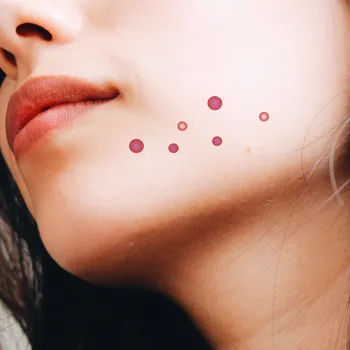It happens every time. The night before an important occasion, you’re staring at a fresh pimple on your face. Acne isn’t exactly known for being convenient, right? What few people know is the existence of a strong link between acne and stress and that there are steps to take to prevent acne formation.

What is Acne?
A common skin condition, acne is caused by blocked hair follicles, usually clogged with excess sebum from the sebaceous glands and an accumulation of dead skin cells. Acne can occur to anyone of any age, even hormonal acne, and there are multiple different factors that can increase one’s chances of developing acne; one of these factors is stress.
Stress and Acne
One of the common questions regarding acne is, can stress cause acne? The answer is no; stress alone cannot cause acne, but it can contribute to it and worsen it if it already exists.
- Hormones: When we stress, hormonal reactions occur within our bodies. These stress reactions stimulate different glands, including the sebaceous glands, which leads to an overproduction of sebum. The presence of too much sebum has been linked to acne.
- Inflammation: Stress raises cortisol levels in the body, which may increase or cause inflammation of the sebaceous glands.
- Skin Defenses: Our skin has natural antimicrobial defenses, but the presence of stress hormones or too many stress hormones can have negative effects on these defenses. Without these defenses, bacteria are free to breed on the skin and infect pores.
Though stress does play a part in the growth of acne, there are steps you can take within your life to prevent and manage stress-related acne.
Preventing Stress-Related Acne
While you can’t cure stress-related acne right away, there are actions you can take to prevent stress-related acne breakouts from occurring, as well as steps to manage them.
Managing Stress
Stress is part of life, but it is manageable. It’s all about making changes in our routine.
- Habits: To help manage stress, it’s important to develop habits that can help you relax and take your mind off of what you’re stressing about. Common techniques are meditation, yoga, and deep breathing, which have been linked to lower cortisol levels, but you’re free to develop whatever habit you wish. The purpose of the habit is to calm you and distract your mind so you can do anything, whether it be exercising, knitting, or cooking.
- Try to get a good night’s sleep. Low-quality sleep can have a drastic effect on your mood and can cause stress.
- Talk to someone about your stress. This can be anyone you trust, friend or family. Studies have shown that we feel better about our stressors when we discuss them.
Managing your stress better not only leads to fewer acne breakouts but also a healthier diet overall. When we stress, some of us tend to stress eat, and some of these foods have high-glycemic levels, which have been linked to acne.
Taking Care of Your Skin
Not only do you have to take care of your stress, but you have to take care of your skin as well. There are many types of acne, but also many prevention techniques.
- Wash your face regularly, but not more than two times per day.
- Wearing looser clothing reduces sweating and allows your skin to breathe.
- Try not to touch your face with your hands. Our hands contain natural oils, as does our hair, and too much touching can cause a breakout.
- Try not to squeeze any pimples. While in the moment it can seem satisfying, it actually makes the breakout worse.
- When using sunscreen and cosmetics, try to use water-based options.
Now that you know the link between stress and acne, you can start managing your stress better and handle acne breakouts like a pro.

















